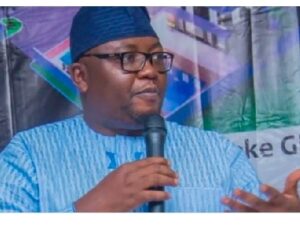Nigeria’s Power Revamp: TCN Requires ₦2.7 Trillion to Transform Electricity Supply – Minister Adelabu
Nigeria’s Power Revamp: TCN Requires ₦2.7 Trillion to Transform Electricity Supply – Minister Adelabu

Adebayo Adelabu, Nigeria’s Minister of Power, has revealed that the Transmission Company of Nigeria (TCN) requires about ₦2.7 trillion to complete 149 ongoing projects nationwide. He emphasized that finalizing these projects would greatly improve the country’s electricity supply.
Adelabu made this known in a statement issued on Tuesday by his spokesperson, Bolaji Tunji, during his budget presentation at the National Assembly. He explained that the funding would be pivotal for TCN’s efforts in improving electricity transmission across Nigeria.
“I am pleased to present to you today the achievements of our ministry since last year and the objectives set for us in the current year,” Adelabu stated. “For TCN alone, an estimated ₦2.779 trillion is required to complete the 149 ongoing projects across the nation. Our ministry’s entire budget falls short of this figure, but, as the saying goes, half a loaf is better than none.”
He further stressed the need for awareness regarding the significant funds required to address Nigeria’s power challenges and called for collaborative efforts in fulfilling the government’s electricity mandate.
On the Siemens project, Adelabu noted that the construction of new substations across the country would strengthen Nigeria’s aging and inefficient power infrastructure, which has been a barrier to progress. He highlighted the government’s commitment to overcoming these obstacles and ensuring a reliable electricity supply for all Nigerians.
“Among the key challenges we face is the grid collapse, which is tied to outdated equipment in our power stations,” he explained. “To address this, the Siemens project will kick off in the first quarter of this year, with the construction of five substations aimed at stabilizing and energizing our power grid. This will significantly reduce the likelihood of grid failures.”
The Minister also added that the ministry would prioritize working with local contractors in its procurement processes to help conserve foreign exchange and streamline the procurement cycle.
“Next week, we will begin awarding contracts for the new substations,” Adelabu concluded.
TRENDING SONGS
 Shock in Anambra: Bride Disappears Moments Before Wedding
Shock in Anambra: Bride Disappears Moments Before Wedding
 Nigerian Woman Returns ₦330 Million Accidentally Credited to Her Account
Nigerian Woman Returns ₦330 Million Accidentally Credited to Her Account
 APC Don Reach Morocco?’ VeryDarkMan Reacts to Seyi Tinubu Poster
APC Don Reach Morocco?’ VeryDarkMan Reacts to Seyi Tinubu Poster
 Bride Breaks Down in Tears as Wedding Meals Were Kept Secretly While Guests Go Home Hungry
Bride Breaks Down in Tears as Wedding Meals Were Kept Secretly While Guests Go Home Hungry
 Odogwu by Day, Robber by Night: How Marriage Joy Turned Into Tragedy
Odogwu by Day, Robber by Night: How Marriage Joy Turned Into Tragedy
 Nigerian Officials Allegedly Pocket N4–6B Weekly Through Smuggling Cartels at Seme–Badagry Border
Nigerian Officials Allegedly Pocket N4–6B Weekly Through Smuggling Cartels at Seme–Badagry Border
 Ahmad Yerima: Naval Officer to Face No Sanctions After Clash with Wike – Matawalle
Ahmad Yerima: Naval Officer to Face No Sanctions After Clash with Wike – Matawalle
 Trending Video: Muslim Man Joins Wife in Hallelujah Challenge ‘Dress Like Your Miracle’ Night
Trending Video: Muslim Man Joins Wife in Hallelujah Challenge ‘Dress Like Your Miracle’ Night
 Woman Seeks Advice as Late Brother’s Wife Refuses to Mourn Him Following His Death With Alleged Mistress
Woman Seeks Advice as Late Brother’s Wife Refuses to Mourn Him Following His Death With Alleged Mistress
 Nobody Cares About Fine Girls In The UK, I Miss Nigeria — Nigerian Lady Laments
Nobody Cares About Fine Girls In The UK, I Miss Nigeria — Nigerian Lady Laments
Share this post with your friends on ![]()













